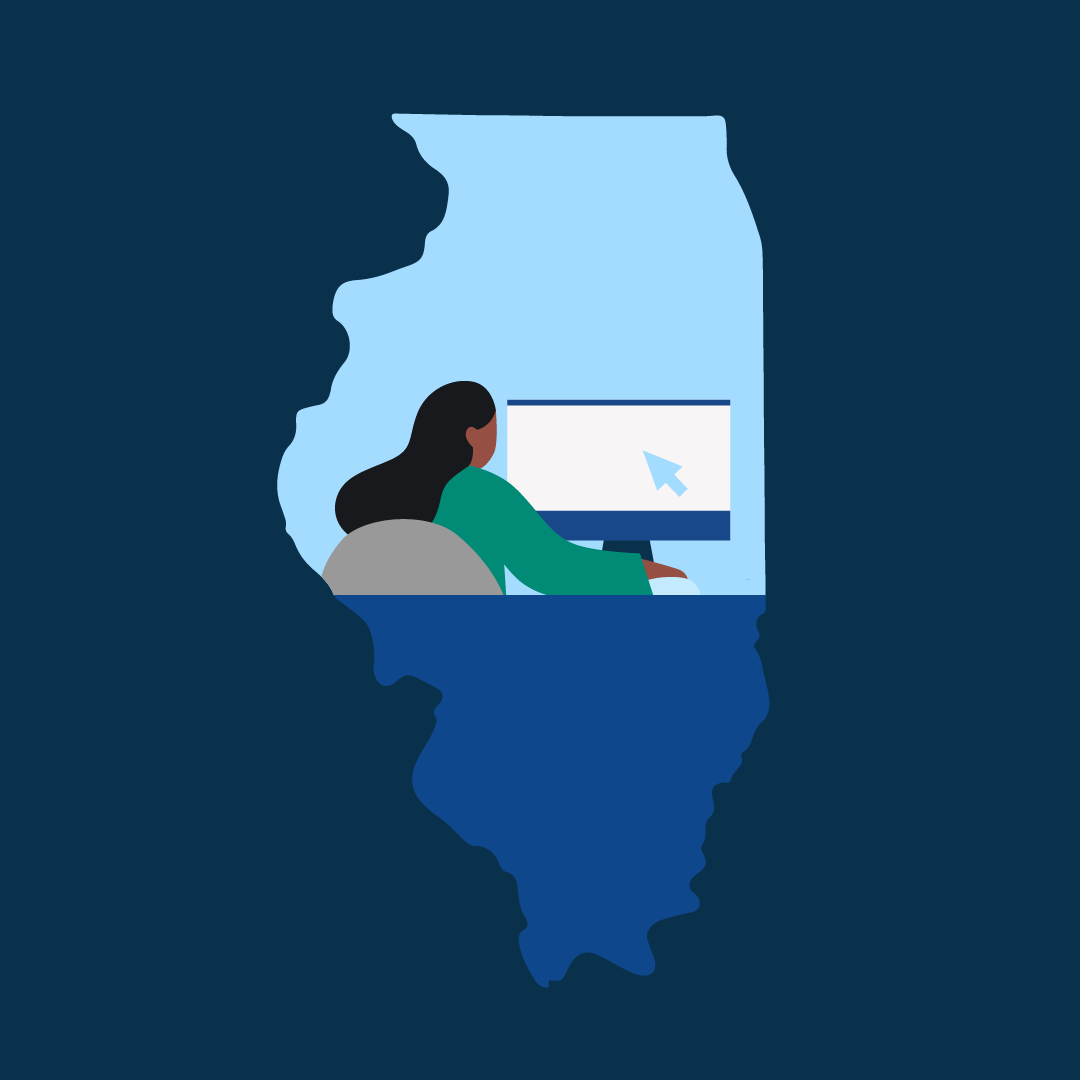Embarking on a career as a paralegal can be incredibly rewarding. As indispensable members of legal teams, paralegals play a crucial role in the pursuit of justice by handling substantive legal tasks.Illinois, with its vibrant legal landscape and diverse opportunities, offers an exceptional environment for aspiring paralegals. From bustling metropolitan hubs like Chicago to smaller suburban communities, paralegals will find an array of legal settings to kickstart their careers and make a meaningful difference.
So, how do you become a paralegal in Illinois? This guide will cover everything you need to know, exploring educational paths, certifications, job prospects, and professional resources.
Education requirements for paralegals in Illinois
In Illinois, there are no mandatory education requirements for paralegals. This gives individuals the flexibility to choose from a variety of paths, each offering a different format and length. Here’s a roundup of some of the paralegal programs in Illinois:
- Associate degree programs. These programs typically span two years and can be found primarily at community colleges, as well as some four-year institutions.
- Bachelor’s degree programs. Although less prevalent, some colleges and universities offer four-year degrees with the option to major or minor in paralegal studies. Alternatively, students may pursue a bachelor’s degree in a related field, such as business, pre-law, or social science.
- Certificate programs. Designed for those who hold an associate or bachelor’s degree, certificate programs in paralegal studies provide an avenue to enhance a paralegal’s skills further and bolster employment prospects. This is the fastest route, generally taking a year or less.
- Master’s degree programs. For those seeking advanced expertise, pursuing a master’s degree in legal studies offers specialized knowledge that can open doors to senior paralegal roles.
- Online programs. Many educational institutions offer online paralegal programs, providing flexibility and accessibility for students looking to balance their studies with other commitments.
With a multitude of options, it’s crucial to carefully research each paralegal program to ensure you’re selecting one that aligns with your career goals and interests. Choosing an American Bar Association (ABA)-approved program is also highly recommended, as these programs adhere to high standards of quality and rigor. There are 14 ABA-approved paralegal programs in Illinois, including:
- Southern Illinois University
- Illinois State University
- Harold Washington College
- Oakton Community College
- Wilbur Wright College
- College of DuPage
- Elgin Community College
- Loyola Community College
- Roosevelt University
- Generations College
- William Rainey Harper College
- Lewis University
- College of Lake County
- South Suburban College
After you’ve decided on a paralegal program, be sure to register for courses that prioritize the development of skills crucial for success in the field. This includes effective communication, organizational proficiency, research acumen, and technological literacy.
What are the requirements to be a paralegal in Illinois?
Becoming a paralegal in Illinois typically involves obtaining a certificate, associate's degree, or bachelor's degree in paralegal studies or a related area of study. While there aren’t any specific educational requirements, many employers prefer candidates with formal education and may require additional certifications or experience.
Certification and licensing for paralegals in Illinois
Paralegals in Illinois can pursue certification through established national organizations like the National Association of Legal Assistants (NALA) and the National Federation of Paralegal Associations (NFPA). Each organization has its own education and experience requirements and examination format. NALA, for instance, offers the Certified Legal Assistant (CLA) exam; while NFPA offers the Paralegal Advanced Competency Exam (PACE).
While it isn’t required, obtaining a paralegal certification in Illinois offers numerous advantages, including:
- Added credibility. Certification enhances a paralegal’s professional credibility, signifying a depth of knowledge to prospective employers. As a result, certified paralegals in Illinois often enjoy greater opportunities for career advancement and job prospects.
- Increased earning potential. Certified paralegals can command higher salaries compared to their non-certified counterparts. That’s because employers recognize the expertise and knowledge that certification brings, which can translate into improved compensation packages and career growth opportunities.
- Insights into the latest trends. Certification requires ongoing education and training, ensuring that paralegals keep up with the latest legal developments, trends, and regulations. This commitment to continuous learning not only enriches one’s professional skill set but also enhances job performance.
Gaining experience and advancing in the field
Equipped with the necessary education and certification, the next step to becoming a paralegal in Illinois is to gain practical experience.
Internships play a central part in the journey to become a paralegal in Illinois. Many educational programs incorporate internships to provide hands-on experience and support a more seamless transition into the legal workforce. So, be sure to look out early on for opportunities across settings that interest you, whether that be within a law firm, corporation, or government institution.
As you prepare to apply, you’ll want to craft a compelling resume and sharpen your interview skills to boost your chances of landing your dream role. To help you do just that, we’ve shared our top tips on how to write a paralegal resume and cover letter and 10 paralegal interview questions you should be prepared for in our blog.
Volunteering and pro bono work are also excellent ways to gain experience as a paralegal. This equips you with invaluable legal skills and offers the chance to impact your community positively.
Finally, while it may initially seem daunting, networking can play a powerful part in setting yourself up for future success. Attending legal seminars, joining professional associations like the Illinois Paralegal Association, participating in online forums, and maintaining a strong presence on social media platforms all go a long way in expanding your network and paving the way to promising opportunities down the road.
Job opportunities and salaries for paralegals in Illinois
Illinois boasts a vibrant job market for paralegals. With an abundance of law firms, corporations, governmental agencies, and nonprofit organizations, paralegals in the state enjoy access to a wide range of employment prospects.
Many paralegals find roles within prestigious law firms, such as Goldberg Kohn and Kirkland & Ellis. Opportunities also abound within corporate legal departments, with Fortune 500 giants like McDonald’s, JPMorgan Chase, and Abbott offering rewarding career pathways for paralegals in Illinois. Government settings also offer enticing prospects, with positions available within state agencies like the Illinois Attorney General’s Office and federal institutions like the U.S. Army. Moreover, aspiring paralegals can find opportunities within nonprofit organizations or academia.
According to the U.S. Bureau of Labor Statistics, there are 12,370 paralegals and legal assistants in Illinois, earning an annual mean wage of $63,590. However, salaries vary significantly based on experience, legal specialization, company size, and geographic location. For instance, the annual median salary of paralegals increases to $65,450 in Chicago.
According to projections, the employment outlook for paralegals and legal assistants is promising, with a projected growth rate of 4% from 2022 to 2032. This growth trajectory aligns with the average rate of expansion across all occupations.
How do paralegals integrate into a law practice?
Paralegals assist attorneys with substantive legal work, including conducting research, drafting documents, organizing case files, and liaising with clients. They play a crucial role in managing administrative tasks and ensuring efficient operations within the legal team.
Professional associations and resources
Joining paralegal associations in Illinois is another strategic step for professionals looking to enrich their careers. By becoming members, paralegals become part of a supportive community of peers who provide guidance, share industry insights, and support professional development. Associations like the Illinois Paralegal Association offer invaluable resources to members, including:
- Networking events
- Educational opportunities
- Access to job postings
Paralegals in Illinois will also find a host of continuing education and professional development opportunities, from online courses and webinars to workshops and conferences offered by organizations like the IPA, NALA, or NFPA. If you’re looking to expand your knowledge of legal technology, you’ll want to attend Clio’s annual conference, ClioCon, which takes place in the fall.
Subscribing to newsletters is another way to keep up with the latest trends and changes to local laws and regulations. To get started on finding the best ones, explore our blog for insights into the 11 top paralegal newsletters for industry updates and more.
It’s worth noting that there’s also a growing demand for paralegals equipped with technological skills. Paralegals with the ability to leverage legal technology, such as legal practice management software, are more sought after than ever. So, as you set out to become a paralegal in Illinois, look out for initiatives like Clio’s Academic Access Program, which provides paralegals with free Clio access in clinical and classroom settings. This will equip you with skills that provide a competitive edge when pursuing opportunities in law firms and other organizations post-graduation.
The final word on becoming a paralegal in Illinois
A career as a paralegal in Illinois promises not just professional fulfillment but also the chance to make a meaningful difference in the legal system. By embarking on an educational path that’s best for their needs, gaining practical experience, and prioritizing ongoing professional development, aspiring paralegals can position themselves for success in this dynamic and rewarding field.





